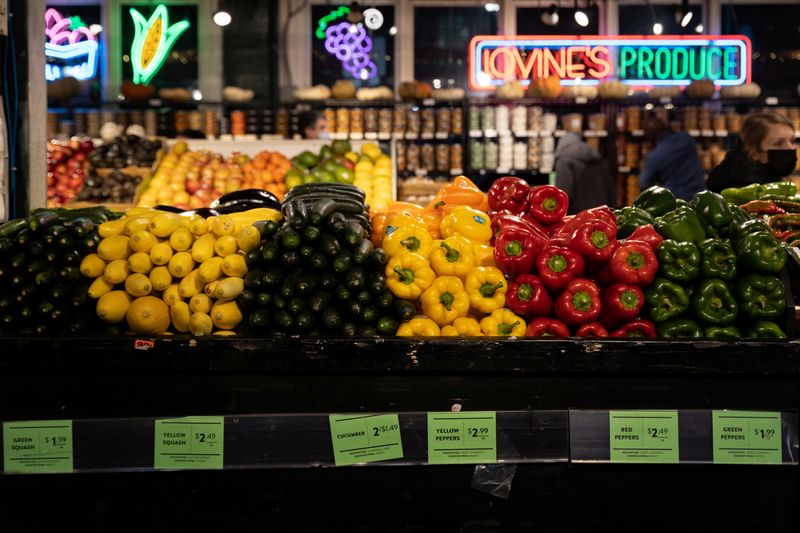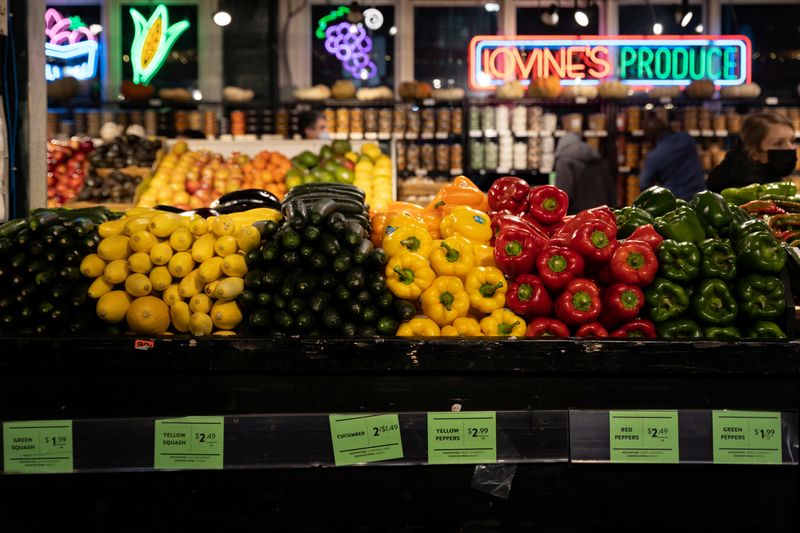Economy
US consumer sentiment sours; dollar aiding inflation fight


© Reuters. FILE PHOTO: Vegetables are pictured at a produce shop at Reading Terminal Market after the inflation rate hit a 40-year high in January, in Philadelphia, Pennsylvania, U.S. February 19, 2022. REUTERS/Hannah Beier/File Photo
By Lucia Mutikani
WASHINGTON (Reuters) – U.S. consumer sentiment deteriorated in October, with households expecting higher inflation over the next year, but labor market strength was likely to continue supporting consumer spending.
The third straight monthly decline in sentiment reported by the University of Michigan on Friday was across nearly all demographic groups and likely reflected a rise in gasoline prices, which has since reversed. Consumers’ 12-month inflation expectations increased to a five-month high.
Sentiment was also likely hurt by violence in the Middle East, with the cutoff date for the survey Oct. 11, days after Palestinian Islamist group Hamas launched its attack on Israel. Other factors that could have weighed on morale include the continuing strike in the automobile industry and political dysfunction in Washington.
“There were a lot of reasons sentiment could have fallen, given different geopolitical events and the macro picture being highly uncertain, but the movements in sentiment are pretty volatile and don’t necessarily move in line with broader spending,” said Shannon Seery, an economist at Wells Fargo in Charlotte, North Carolina. “Our forecast for spending is a continued slowdown rather than a collapse.”
The University of Michigan’s preliminary reading on the overall index of consumer sentiment came in at 63.0 this month compared with 68.1 in September. Economists polled by Reuters had forecast a preliminary reading of 67.2.
So far there has not been a strong correlation between sentiment and consumer spending, which continues to be driven by higher wages from a tight labor market. Consumers still have excess savings accumulated during the COVID-19 pandemic. The economy created 336,000 jobs in September.
The survey’s reading of one-year inflation expectations increased to 3.8% this month from 3.2% in September. This was the highest reading since May 2023 and remained well above the 2.3% to 3.0% range seen in the two years before the pandemic.
The five-year inflation outlook rose to 3.0% from 2.8% in the prior month, staying within the narrow 2.9% to 3.1% range for 25 of the last 27 months. Federal Reserve officials are closely watching inflation expectations as they contemplate the future course of monetary policy.
Since March 2022, the U.S. central bank has raised its benchmark overnight interest rate by 525 basis points to the current 5.25% to 5.50% range.
Stocks on Wall Street gave up some gains on the inflation expectations data. The dollar was steady against a basket of currencies. U.S. Treasury prices rose.
IMPORT DEFLATION
But the news on inflation was not all downbeat.
A separate report from the Labor Department showed import prices barely rising in September as a strong dollar depressed prices of non-petroleum products, which over time will help to lower domestic inflation.
Import prices edged up 0.1% last month after climbing 0.6% in August. Economists had forecast import prices, which exclude tariffs, would gain 0.5%.
“The stronger U.S. dollar on the back of higher bond yields may be in danger of pricing American exports out of world markets, but it is doing one good thing, which is tamping down the prices of imported goods coming into the country and aiding the Fed’s inflation fight,” said Christopher Rupkey, chief economist at FWDBONDS in New York.
Prices for imported fuel rose 4.4% after advancing 8.8% in August. Imported food prices dropped 1.3%. Excluding petroleum, import prices decreased 0.3%.
In the 12 months through September, import prices dropped 1.7% after falling 2.9% in August. Annual import prices have now declined for eight straight months.
While data this week showed producer and consumer prices rising more than expected in September, underlying inflation remained moderate. That trend, together with a rise in U.S. Treasury yields is expected to discourage the Fed from raising interest rates next month.
Excluding fuels and food, import prices slipped 0.1% after dropping 0.3% in August. These so-called core import prices decreased 1.1% on a year-on-year basis in September, reflecting the dollar’s strength against the currencies of the United States’ main trading partners.
The dollar has gained about 1.95% on a trade-weighted basis so far this year. The cost of imported capital goods fell 0.1% for a second straight month in September.
Prices for imported motor vehicles, parts and engines also dipped 0.1%, while those of consumer goods excluding automobiles were unchanged. The cost of goods imported from China dropped 0.3% after being unchanged in the previous month.
They fell 2.6% on a year-on-year basis in September, the largest decline since October 2009. Prices of goods imported from Canada increased 0.8%, but declined 6.7% on a year-on-year basis. Mexican goods import prices rose 3.7% year-on-year.
“Declining import prices for consumer goods and auto parts should minimize the risk of a resurgence in consumer inflation,” said Jeffrey Roach, chief economist at LPL Financial (NASDAQ:) in Charlotte, North Carolina.
Economy
Russian central bank says it needs months to make sure CPI falling before rate cuts -RBC


© Reuters. Russian Central Bank Governor Elvira Nabiullina attends a news conference in Moscow, Russia June 14, 2019. REUTERS/Shamil Zhumatov/File Photo
MOSCOW (Reuters) – Russia’s central bank will need two to three months to make sure that inflation is steadily declining before taking any decision on interest rate cuts, the bank’s governor Elvira Nabiullina told RBC media on Sunday.
The central bank raised its key interest rate by 100 basis points to 16% earlier in December, hiking for the fifth consecutive meeting in response to stubborn inflation, and suggested that its tightening cycle was nearly over.
Nabiullina said it was not yet clear when exactly the regulator would start cutting rates, however.
“We really need to make sure that inflation is steadily decreasing, that these are not one-off factors that can affect the rate of price growth in a particular month,” she said.
Nabiullina said the bank was taking into account a wide range of indicators but primarily those that “characterize the stability of inflation”.
“This will take two or three months or more – it depends on how much the wide range of indicators that characterize sustainable inflation declines,” she said.
The bank will next convene to set its benchmark rate on Feb. 16.
The governor also said the bank should have started monetary policy tightening earlier than in July, when it embarked on the rate-hiking cycle.
Economy
China identifies second set of projects in $140 billion spending plan


© Reuters. FILE PHOTO: Workers walk past an under-construction area with completed office towers in the background, in Shenzhen’s Qianhai new district, Guangdong province, China August 25, 2023. REUTERS/David Kirton/File Photo
SHANGHAI (Reuters) – China’s top planning body said on Saturday it had identified a second batch of public investment projects, including flood control and disaster relief programmes, under a bond issuance and investment plan announced in October to boost the economy.
With the latest tranche, China has now earmarked more than 800 billion yuan of its 1 trillion yuan ($140 billion) in additional government bond issuance in the fourth quarter, as it focuses on fiscal steps to shore up the flagging economy.
The National Development and Reform Commission (NDRC) said in a statement on Saturday it had identified 9,600 projects with planned investment of more than 560 billion yuan.
China’s economy, the world’s second largest, is struggling to regain its footing post-COVID-19 as policymakers grapple with tepid consumer demand, weak exports, falling foreign investment and a deepening real estate crisis.
The 1 trillion yuan in additional bond issuance will widen China’s 2023 budget deficit ratio to around 3.8 percent from 3 percent, the state-run Xinhua news agency has said.
“Construction of the projects will improve China’s flood control system, emergency response mechanism and disaster relief capabilities, and better protect people’s lives and property, so it is very significant,” the NDRC said.
The agency said it will coordinate with other government bodies to make sure that funds are allocated speedily for investment and that high standards of quality are maintained in project construction.
($1 = 7.1315 renminbi)
Economy
Russian central bank says it needs months to make sure CPI falling before rate cuts -RBC


© Reuters. Russian Central Bank Governor Elvira Nabiullina attends a news conference in Moscow, Russia June 14, 2019. REUTERS/Shamil Zhumatov/File Photo
MOSCOW (Reuters) – Russia’s central bank will need two to three months to make sure that inflation is steadily declining before taking any decision on interest rate cuts, the bank’s governor Elvira Nabiullina told RBC media on Sunday.
The central bank raised its key interest rate by 100 basis points to 16% earlier in December, hiking for the fifth consecutive meeting in response to stubborn inflation, and suggested that its tightening cycle was nearly over.
Nabiullina said it was not yet clear when exactly the regulator would start cutting rates, however.
“We really need to make sure that inflation is steadily decreasing, that these are not one-off factors that can affect the rate of price growth in a particular month,” she said.
Nabiullina said the bank was taking into account a wide range of indicators but primarily those that “characterize the stability of inflation”.
“This will take two or three months or more – it depends on how much the wide range of indicators that characterize sustainable inflation declines,” she said.
The bank will next convene to set its benchmark rate on Feb. 16.
The governor also said the bank should have started monetary policy tightening earlier than in July, when it embarked on the rate-hiking cycle.

 Forex3 years ago
Forex3 years agoForex Today: the dollar is gaining strength amid gloomy sentiment at the start of the Fed’s week

 Forex3 years ago
Forex3 years agoUnbiased review of Pocket Option broker

 Forex3 years ago
Forex3 years agoDollar to pound sterling exchange rate today: Pound plummeted to its lowest since 1985

 Forex3 years ago
Forex3 years agoHow is the Australian dollar doing today?

 Cryptocurrency3 years ago
Cryptocurrency3 years agoWhat happened in the crypto market – current events today

 World3 years ago
World3 years agoWhy are modern video games an art form?

 Commodities3 years ago
Commodities3 years agoCopper continues to fall in price on expectations of lower demand in China

 Economy3 years ago
Economy3 years agoCrude oil tankers double in price due to EU anti-Russian sanctions



























